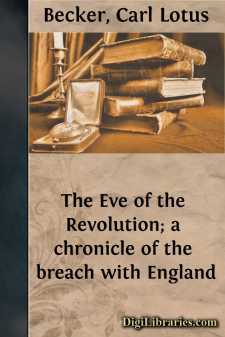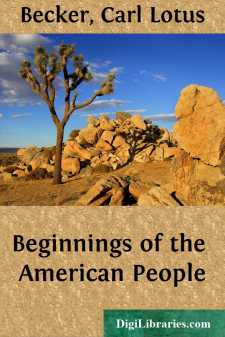Categories
- Antiques & Collectibles 13
- Architecture 36
- Art 48
- Bibles 22
- Biography & Autobiography 813
- Body, Mind & Spirit 142
- Business & Economics 28
- Children's Books 15
- Children's Fiction 12
- Computers 4
- Cooking 94
- Crafts & Hobbies 4
- Drama 346
- Education 46
- Family & Relationships 57
- Fiction 11828
- Games 19
- Gardening 17
- Health & Fitness 34
- History 1377
- House & Home 1
- Humor 147
- Juvenile Fiction 1873
- Juvenile Nonfiction 202
- Language Arts & Disciplines 88
- Law 16
- Literary Collections 686
- Literary Criticism 179
- Mathematics 13
- Medical 41
- Music 40
- Nature 179
- Non-Classifiable 1768
- Performing Arts 7
- Periodicals 1453
- Philosophy 64
- Photography 2
- Poetry 896
- Political Science 203
- Psychology 42
- Reference 154
- Religion 513
- Science 126
- Self-Help 84
- Social Science 81
- Sports & Recreation 34
- Study Aids 3
- Technology & Engineering 59
- Transportation 23
- Travel 463
- True Crime 29
The Eve of the Revolution; a chronicle of the breach with England
Categories:
Description:
Excerpt
CHAPTER I. A Patriot Of 1763
His Majesty's reign... I predict will be happy and truly
glorious.—Benjamin Franklin.
The 29th of January, 1757, was a notable day in the life of Ben Franklin of Philadelphia, well known in the metropolis of America as printer and politician, and famous abroad as a scientist and Friend of the Human Race. It was on that day that the Assembly of Pennsylvania commissioned him as its agent to repair to London in support of its petition against the Proprietors of the Province, who were charged with having "obstinately persisted in manacling their deputies [the Governors of Pennsylvania] with instructions inconsistent not only with the privileges of the people, but with the service of the Crown." We may, therefore, if we choose, imagine the philosopher on that day, being then in his fifty-first year, walking through the streets of this metropolis of America (a town of something less than twenty thousand inhabitants) to his modest home, and there informing his "Dear Debby" that her husband, now apparently become a great man in a small world, was ordered immediately "home to England."
In those leisurely days, going home to England was no slight undertaking; and immediately, when there was any question of a great journey, meant as soon as the gods might bring it to pass. "I had agreed with Captain Morris, of the Pacquet at New York, for my passage," he writes in the "Autobiography," "and my stores were put on board, when Lord Loudoun arrived at Philadelphia, expressly, as he told me, to endeavor an accommodation between the Governor and the Assembly, that his Majesty's service might not be obstructed by their dissentions." Franklin was the very man to effect an accommodation, when he set his mind to it, as he did on this occasion; but "in the mean time," he relates, "the Pacquet had sailed with my sea stores, which was some loss to me, and my only recompence was his Lordship's thanks for my service, all the credit for obtaining the accommodation falling to his share."
It was now war time, and the packets were at the disposal of Lord Loudoun, commander of the forces in America. The General was good enough to inform his accommodating friend that of the two packets then at New York, one was given out to sail on Saturday, the 12th of April—"but," the great man added very confidentially, "I may let you know, entre nous, that if you are there by Monday morning, you will be in time, but do not delay longer." As early as the 4th of April, accordingly, the provincial printer and Friend of the Human Race, accompanied by many neighbors "to see him out of the province," left Philadelphia. He arrived at Trenton "well before night," and expected, in case "the roads were no worse," to reach Woodbridge by the night following. In crossing over to New York on the Monday, some accident at the ferry delayed him, so that he did not reach the city till nearly noon, and he feared that he might miss the packet after all—Lord Loudoun had so precisely mentioned Monday morning....



